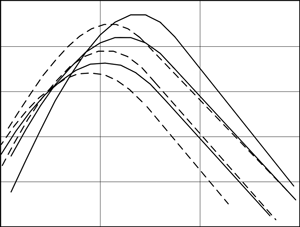The impact of distortions of phase-shift keyed signals with gradual phase change in the receiver input circuits on the signal detection characteristics during the signal reception against the background of noise
DOI:
https://doi.org/10.3103/S0735272712080031Keywords:
phase-shift keyed signal, radiolocation, random process, elementary pulse, Barker code, stepwise change, regular and fluctuating componentsAbstract
This study examines the impact of an input band-pass filter on the reception of phase-shift keyed signals (PSKS) with gradual phase change against the background of noises. In the case under investigation PSKS are received by a correlation receiver during the radar detection of targets. Analytical expressions of the target detection characteristics were obtained for PSKS with random initial phase and the amplitude containing regular and fluctuating components. This study also examines the relationships of the detection characteristics as a function of the input filter band-pass and the interval duration of gradual phase change.
References
- Ch. Cook and M. Bernfeld, Radar Signals (Academic Press, New York, 1967).
- G. S. Nakhmanson and A. V. Suslin, “Characteristics of the Radar Phase-Shift Keyed Signal with Gradual Phase Change,” in Proc. of XVII Int. Sci. and Tech. Conf. “Radiolocation, Navigation, and Communications 2011,” 12–14 April 2011, Voronezh, Russia (Voronezh, 2011), Vol. 3, pp. 2259–2266.
- G. S. Nakhmanson and A. V. Suslin, “Detection of Phase-Shift Keyed Signals with Gradual Phase Change during Reception on the Background of Noise,” Izv. Vyssh. Uchebn. Zaved., Radioelektron. 55(1), 55 (2012) [Radioelectron. Commun. Syst. 55(1), 43 (2012)].
- G. S. Nakhmanson and G. A. Bakaeva, “The Output Effect of a Quadrature Receiver with Input Band-Pass Filter during the Reception of the Phase-Shift Keyed Signal Radiated by a Moving Source,” Telekommunikatsii, No. 11, 25 (2007).
- V. I. Tikhonov, Statistical Radio Engineering (Sov. Radio, Moscow, 1966) [in Russian].

Downloads
Published
2012-08-01
Issue
Section
Research Articles

